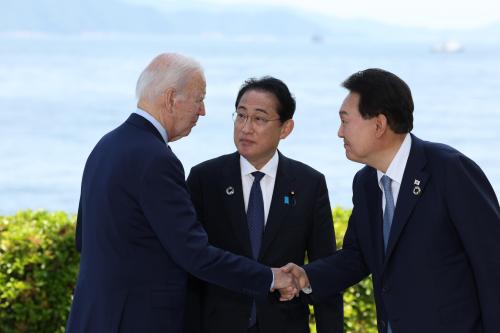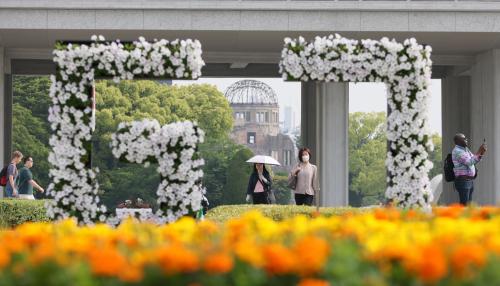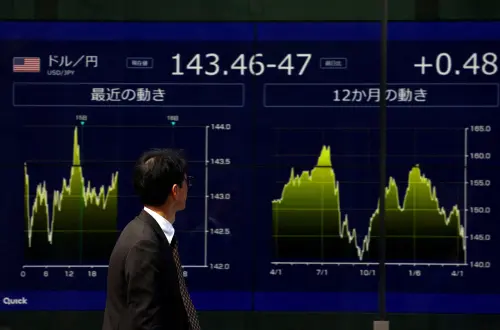Although Japan has no nationwide election scheduled for 2024, the temperature in domestic politics is running high. Until a few weeks ago, the big question in the Japanese political scene was whether Prime Minister Fumio Kishida would be able to boost public support enough to wield the ultimate lever in his toolbox: calling a snap election at a time of his choosing, to maximize his party’s chances at the polls. That option now seems more remote after recent developments have continued to suppress his cabinet’s approval ratings.
Instead, the core questions in the national conversation are more primordial: Can Kishida’s party, the dominant Liberal Democratic Party (LDP), finally eschew the factional politics that have long set the tone of intraparty dynamics? Can the LDP deliver on an agenda of political reform—something it has historically struggled to achieve—to restore public confidence?
At stake is the survival of Kishida’s premiership, with party president elections this fall. This is further complicated by the disarray of Japan’s factional system that has structured competition within the ruling party for decades and the prospect of domestic issues distracting from Japan’s proactive foreign policy agenda.
Kishida’s tenure rocked by political scandals
Successors to Shinzo Abe, Japan’s longest-serving prime minister, have always had big shoes to fill. Their success is measured by their ability to drum up public support that can win the party elections and secure enough political capital to implement ambitious national and foreign policies. Although Kishida clinched solid wins for his coalition ticket (with the lay-Buddhist party Komeito) in the lower and upper house elections in 2021 and 2022, his track record on foreign policy is stronger than his domestic performance. Joining the international coalition to support Ukraine; adopting the first-of-its-kind economic security promotion law; revising Japan’s three strategic security documents, which included a pledge to boost defense expenditures; hosting a successful G7 summit; and improving historically frayed relations with South Korea to advance unprecedented trilateral cooperation with the United States are all feathers in Kishida’s cap.
Kishida’s foreign policy activism, however, has not elicited a domestic political upswing. The Japanese public remains unconvinced about Kishida’s promise to bring forth a “New Capitalism” that balances growth and distribution at a time when inflation and yen depreciation squeeze citizens’ wallets.
Political drama has also rocked the Kishida administration. Only one year into Kishida’s tenure, the country was shaken by Abe’s murder on July 8, 2022. As the assassin’s motives came into view—blaming Abe for LDP politicians’ ties to the Unification Church that had exploited his family—a broader scandal ensued. Kishida responded with measures to cut party members’ ties to the Unification Church, offer legal redress to its victims, and petition the courts to strip its religious corporation status to end its tax privileges. This, however, did not improve the cabinet’s approval rates, which have stayed below 30 percent since October 2023 and now sit at a perilous 23 percent.
Moreover, a scandal over the LDP’s use of slush funds has undermined public trust and put control over the party in question. The timing could not be worse for Kishida, as indicators showing Japan may be leaving behind the era of deflation (more robust wage increases, price increases in services, and hints from the Bank of Japan’s governor that an exit from negative interest rates is on the horizon) are overshadowed by the unfolding political drama.
In late 2023 and early 2024, revelations about the failure of some LDP factions to properly disclose over $6 million in revenue from fundraising parties and kickbacks to party members began trickling in. Now, four of the main six factions have been dissolved after being found to carry out such practices, including the Kishida faction. Prosecutors have charged several lawmakers, secretaries, and accountants for their involvement in slush funds, but no major senior political figure to date.
Last December, Kishida asked for the resignation of his own chief cabinet secretary, three cabinet ministers, and several senior party officials given their past roles in the management of the implicated factions. With no signs of the scandal abating, the prime minister announced the creation of an internal Political Reform Taskforce to address broader issues of transparency, accountability, and party governance.
The factions’ future
By mid-January 2024, a clear focal point had emerged: the factions’ future. Japan’s post-World War II electoral system—with multi-member electoral districts—pitted fellow LDP politicians against each other at election time. This made for intense intraparty competition that was managed through factions. Membership in a faction was essential for LDP politicians to secure party nomination and run in an electoral district, fund their campaign and provide constituent services, and obtain backing for promotion to senior positions in the party and government. Fierce factional competition also meant that the greatest peril to the LDP’s continued hold on power was defection from a major faction. This lesson was bitterly learned in 1993 when the Ozawa grouping bolted and brought about the LDP’s fall from power (albeit briefly).
The electoral system adopted in 1994 created a hybrid system of single-member districts and proportional representation regional blocks. Together with tightened political funding rules in 1994, these reforms weakened but did not eliminate the factions. The factions lost their hold on the electoral district nomination process, but they continued to provide key benefits (i.e., money and promotions).
Kishida’s decision to dissolve his own faction on January 16 shocked many. Three other factions (Abe and Toshihiro Nikai’s, then Hiroshi Moriyama’s) followed suit; however, Tarō Asō and Toshimitsu Motegi noted their own factions have not been implicated and declined to dissolve them. After only two weeks of deliberation, the LDP Political Reform Taskforce issued an interim report: it does not call for the dismantling of all factions, but forbids them from hosting fundraising parties and providing seasonal funds to their members, gives the party the power to dissolve factions found in violation of the Political Funds Control Act, introduces greater online transparency to political contributions, and introduces co-responsibility for shoddy financial practices so that LDP politicians cannot shift accountability to accountants. The report also calls for the end of factional nominations for party and government appointments. Yet questions remain about the new rules’ enforcement.
Will this time be different?
Kishida’s efforts are meant to transform the factions from being held together by the allure of funds and appointments, into genuine policy-focused groupings that can nurture a young and diverse generation of politicians. The January 2024 sketch of political reform, however, is unlikely to accomplish this. As in the past, politicians may find new loopholes in the political funding rules. Individual politicians are not forbidden from hosting fundraising parties, for example, and the interim report only promises a follow-up on creating the shift from a system of faction endorsement to whole-of-party management of the appointment process. Merely relabeling the factions as “policy groups” lacks credibility, as such a fix was already attempted with reforms in the 1990s. And it is difficult for the prime minister to portray himself as a crusader for political reform when he has let each faction decide its own future.
The public certainly remains skeptical. When asked about Kishida’s announcement to dissolve his faction, 61 percent said they approved of the decision, but 72 percent said that they did not think the LDP disbanding the factions would restore trust in politics, indicating a long road ahead to restore the LDP’s image.
A party election of national consequence
The factions’ role has been in flux for some time. Before the scandal broke, around 20 percent of LDP politicians were unaffiliated with factions. Two former prime ministers built their brands on rejecting factional politics— Junichiro Koizumi in the early 2000s and Yoshihide Suga decades later. But by and large, factions proved resilient because they helped structure the race to the top within the party. It is unclear whether the public’s distrust of factions and the new bans on their fundraising and appointment activities will be enough in the long term to constitute a tipping point toward their further decline.
Regardless, the LPD factions’ disarray will have important near-term consequences. The current upheaval has muddied the waters around the party president election scheduled for this September. Because Japan has a parliamentary system and a dominant ruling party, the LDP leadership vote paves the way to the premiership. Factional bosses have had an advantage since they could count on their members’ support, but these certainties no longer apply since major factions have closed and those that remain are also losing senior members seeking to avoid PR damage by association. There is also pressure for the party to censor or expel senior members of the Abe faction, further rocking the boat.
It is hard to predict whether Kishida’s gamble on political reform will pay off and win him reelection as the LDP party president. But the stakes go beyond Japan. Kishida will visit Washington this April while battling to restore public trust at home and assert control over his own party. The risk of greater uncertainty in Japanese domestic politics is not that Tokyo may change its foreign policy direction, but rather that low public trust and LDP infighting may shorten the tenure of prime ministers and distract from pressing geopolitical challenges, potentially affecting Japan’s impact in the region.
The Brookings Institution is committed to quality, independence, and impact.
We are supported by a diverse array of funders. In line with our values and policies, each Brookings publication represents the sole views of its author(s).







Commentary
Can Japan’s Kishida deliver on political reform?
More than domestic governance is at stake
February 2, 2024